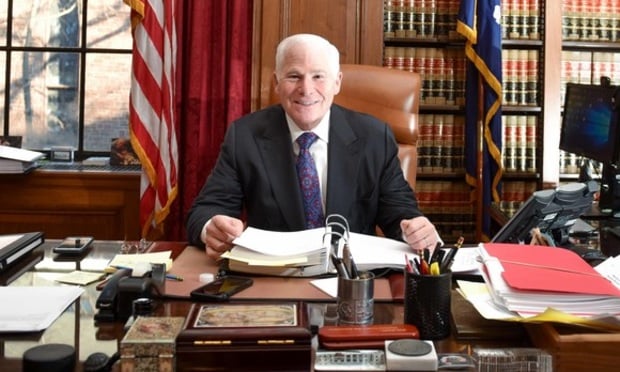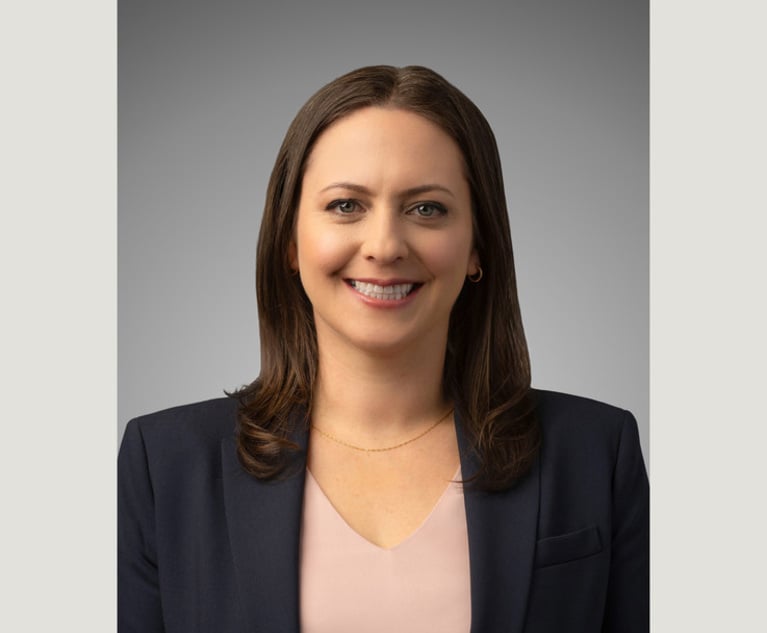NY Appeals Judges Say Trial Courts Should Act to Quell Appeal Waiver Challenges
Two justices from the Appellate Division, Second Department issued separate signed opinions in which both said that trial court judges should take extra steps to ensure that defendants are knowingly and intelligently waiving their appeal rights.
November 09, 2018 at 04:03 PM
6 minute read
 Justice Scheinkman. Photo: David Handschuh/ALM
Justice Scheinkman. Photo: David Handschuh/ALM
The number of criminal defendants who are challenging their waivers to their right to appeal is increasing throughout New York's appeals courts, and appellate justices in Brooklyn are calling on trial judges to take greater care to ensure that defendants understand what they're getting themselves into.
In a ruling upholding a 16-year prison sentence for a Queens man who pleaded guilty to first-degree robbery as part of a plea deal in which he waived his right to appeal, two justices from the Appellate Division, Second Department issued separate signed opinions in which both said that trial court judges should take extra steps to ensure that defendants are knowingly and intelligently waiving their appeal rights. The safeguard could spare the court from having to handle unnecessary litigation.
Presiding Justice Alan Scheinkman, writing in concurrence with a ruling by Justice John Leventhal, said that myriad “ad hoc and idiosyncratic” colloquies by trial court judges have led to an expansion of fact-intensive “waiver of appeal jurisprudence” that forces appellate justices to painstakingly pore over individual judges' lines of questioning to defendants about appeal waivers, then compare those same judges' inquiries with inquiries they employed in other cases.
“It is time, perhaps even past time, to stress how important it is for trial courts to take the few additional moments necessary to assure themselves that any waiver of appeal is valid,” Scheinkman said.
Scheinkman said that the Second Department has found through its research that, by a conservative estimate, the four departments of the state's Appellate Division have found appeals waivers to be invalid in at least 380 instances over the last five years—more than 200 of which came from the Second Department.
The decision comes as reducing case backlogs in New York courts remains a top priority for judges and officials across the state, and the Second Department, considered one of the busiest appellate courts in the country, stands as a prime example of an overburdened court.
The Second Department covers a sprawling 10-county jurisdiction that includes three New York City boroughs, Long Island and the counties that make up the Hudson Valley; it disposed of 10,328 cases, while the other three Appellate Division departments disposed of 6,077 combined.
Despite the Second Department justices' best efforts, it can take as long as 18 months for civil appeals to get on the court's day calendar, Scheinkman said in a column published in the Law Journal.
To tackle its backlogs, the court has taken steps such as increasing the number of oral arguments it hears each week as well as establishing a “special bench” to address severely delayed matrimonial and Commercial Division cases, as well as zoning and land use disputes.
Scheinkman said, that while trial judges should not turn appeal waiver colloquies into “unthinking formulaic rituals,” it would help the court in its effort to move cases through if trial judges resort to a model form of colloquy.
Leventhal suggested that judges can look to a model colloquy for appeal waivers on the Office of Court Administration's website, as well as the Second Department's 2014 ruling in People v. Brown for guidance on providing valid appeal waiver inquiries.
Scheinkman said that, if the waivers are given as part of a plea bargain, then prosecutors should play a proactive role to make sure that judges are asking defendants the right questions.
In the case at hand, Leventhal wrote that defendant Anardo Batista, who was convicted of beating a pizza delivery person over the head with a baseball bat during a 2010 robbery, validly waived his right to an appeal.
Justices Betsy Barros, Francesca Connolly and Angela Iannacci joined on both opinions.
Assistant District Attorneys John Castellano, Johnnette Traill, Anastasia Spanakos and Eleanor Reilly appeared for the Queens District Attorney's Office.
Alexander Donn, a supervising attorney with Appellate Advocates, represented Batista on appeal.
The fact that two Second Department judges issued signed opinions in a decision to deny an excessive sentence appeal, which may require just a paragraph or two, is a sign that the court is trying to send a clear message to the lower courts to adopt best practices that lighten the burden on the Appellate Division, said Robert Rosborough IV, a partner at Whiteman Osterman & Hanna who specializes in appellate litigation.
“They take this issue seriously and they want the trial courts to get this corrected,” Rosborough said.
Leventhal said that the Court of Appeals established in a 1989 ruling that enforcing appeal waivers serves the public interest concerns underlying plea bargains—they help to seal the plea deals and “hold parties to their bargains.”
But, Leventhal notes in his ruling, there are critics who say courts should not enforce appeal waivers at all.
Among them is Nancy Gertner, a retired federal judge who is on the faculty at Harvard Law School, who said the right to appeal should be as sacrosanct in the criminal justice system as the right to counsel and that it should be taken off the table for plea deals, especially at a time when the vast majority of criminal cases are resolved through plea deals.
As for reducing backlog, Gertner said that justice should take priority over case management.
“The more the criminal justice system becomes a mill, the more you see it taking in people who are one, innocent; two, poor; and three, black,” Gertner said.
Read more:
2nd Department Is Changing the Way It Operates to Reduce Backlogs
NY Lawyers Eye Impact of New Statewide Appellate Rules
NY Court System Spending Is Highest Per Capita in the Nation
This content has been archived. It is available through our partners, LexisNexis® and Bloomberg Law.
To view this content, please continue to their sites.
Not a Lexis Subscriber?
Subscribe Now
Not a Bloomberg Law Subscriber?
Subscribe Now
NOT FOR REPRINT
© 2025 ALM Global, LLC, All Rights Reserved. Request academic re-use from www.copyright.com. All other uses, submit a request to [email protected]. For more information visit Asset & Logo Licensing.
You Might Like
View All
Weil Lures DOJ Antitrust Lawyer, As Government Lateral Moves Pick Up Before Inauguration Day
4 minute readTrending Stories
- 1Former Phila. Solicitor Sozi Tulante Rejoins Dechert
- 2'I've Seen Terrible Things': Lawyer Predicts Spike in Hazing Suits
- 3SEC Ordered to Explain ‘How and When the Federal Securities Laws Apply to Digital Assets’
- 4NY Trial Court Halts State Dragnet on Licensed Hemp Operators
- 5Report: US Attorney E. Martin Estrada to Resign From California's Central District
Who Got The Work
Michael G. Bongiorno, Andrew Scott Dulberg and Elizabeth E. Driscoll from Wilmer Cutler Pickering Hale and Dorr have stepped in to represent Symbotic Inc., an A.I.-enabled technology platform that focuses on increasing supply chain efficiency, and other defendants in a pending shareholder derivative lawsuit. The case, filed Oct. 2 in Massachusetts District Court by the Brown Law Firm on behalf of Stephen Austen, accuses certain officers and directors of misleading investors in regard to Symbotic's potential for margin growth by failing to disclose that the company was not equipped to timely deploy its systems or manage expenses through project delays. The case, assigned to U.S. District Judge Nathaniel M. Gorton, is 1:24-cv-12522, Austen v. Cohen et al.
Who Got The Work
Edmund Polubinski and Marie Killmond of Davis Polk & Wardwell have entered appearances for data platform software development company MongoDB and other defendants in a pending shareholder derivative lawsuit. The action, filed Oct. 7 in New York Southern District Court by the Brown Law Firm, accuses the company's directors and/or officers of falsely expressing confidence in the company’s restructuring of its sales incentive plan and downplaying the severity of decreases in its upfront commitments. The case is 1:24-cv-07594, Roy v. Ittycheria et al.
Who Got The Work
Amy O. Bruchs and Kurt F. Ellison of Michael Best & Friedrich have entered appearances for Epic Systems Corp. in a pending employment discrimination lawsuit. The suit was filed Sept. 7 in Wisconsin Western District Court by Levine Eisberner LLC and Siri & Glimstad on behalf of a project manager who claims that he was wrongfully terminated after applying for a religious exemption to the defendant's COVID-19 vaccine mandate. The case, assigned to U.S. Magistrate Judge Anita Marie Boor, is 3:24-cv-00630, Secker, Nathan v. Epic Systems Corporation.
Who Got The Work
David X. Sullivan, Thomas J. Finn and Gregory A. Hall from McCarter & English have entered appearances for Sunrun Installation Services in a pending civil rights lawsuit. The complaint was filed Sept. 4 in Connecticut District Court by attorney Robert M. Berke on behalf of former employee George Edward Steins, who was arrested and charged with employing an unregistered home improvement salesperson. The complaint alleges that had Sunrun informed the Connecticut Department of Consumer Protection that the plaintiff's employment had ended in 2017 and that he no longer held Sunrun's home improvement contractor license, he would not have been hit with charges, which were dismissed in May 2024. The case, assigned to U.S. District Judge Jeffrey A. Meyer, is 3:24-cv-01423, Steins v. Sunrun, Inc. et al.
Who Got The Work
Greenberg Traurig shareholder Joshua L. Raskin has entered an appearance for boohoo.com UK Ltd. in a pending patent infringement lawsuit. The suit, filed Sept. 3 in Texas Eastern District Court by Rozier Hardt McDonough on behalf of Alto Dynamics, asserts five patents related to an online shopping platform. The case, assigned to U.S. District Judge Rodney Gilstrap, is 2:24-cv-00719, Alto Dynamics, LLC v. boohoo.com UK Limited.
Featured Firms
Law Offices of Gary Martin Hays & Associates, P.C.
(470) 294-1674
Law Offices of Mark E. Salomone
(857) 444-6468
Smith & Hassler
(713) 739-1250









